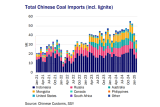
Europe’s consumption of UCO biofuels reached nearly seven million tonnes in 2023, far exceeding its domestic collection capabilities. This high demand has led to increased imports from Asian countries, particularly China, Indonesia and Malaysia, which collectively supply a substantial portion of Europe’s UCO needs.
Chinese exports of UCO have surged, driven by incentives from the US Inflation Reduction Act, redirecting significant volumes previously destined for Europe to the United States. Concurrently, Europe saw a 40% rise in Chinese biodiesel imports in 2023, raising suspicions about the authenticity of these imports due to potential mislabelling of virgin oils as UCO to exploit high incentives for waste-based biofuels.
UCO biofuels form a crucial part of Europe’s renewable energy strategy, accounting for a significant share of conventional biodiesel and hydrotreated vegetable oil (HVO). Furthermore, UCO is a key feedstock for sustainable aviation fuel (SAF), whose demand is growing rapidly. However, the supply of UCO will likely fall short of the future demand for various biofuel applications, leading to potential shortages and increased fraud risks. For instance, Ryanair’s SAF target would require the entirety of Europe’s UCO collection potential by 2030.
To address these issues, the EU has several potential measures at its disposal:
- Restrict Imports: Implement stricter controls on UCO imports and potentially reject certification from non-compliant producers.
- Reinforce Policy Measures: Strengthen regulations and ensure that European and national authorities are well-equipped to combat fraud.
- Review Certification Systems: Overhaul the certification processes to ensure the authenticity and traceability of UCO imports.
- Support Cleaner Alternatives: Promote the development and adoption of alternative clean energy sources like electrification and hydrogen fuels.
At the same time, a new Republican administration under Trump may reverse parts of the US Inflation Reduction Act, therefore reducing the demand for biofuel feedstocks while increasing tariffs on Chinese-origin products. Meanwhile, Chinese companies are building domestic SAF production capacity in anticipation of an imminent government mandate that will likely be implemented in 2024/25.
All this points in the direction of reduced biofuel feedstock flows between Asia and Europe/US from 2025 onwards. Similarly, palm oil volumes are already under pressure from tighter environmental regulations in Europe, and this is expected to remain so.
By Plamen Aleksandrov, Market Researcher, Chemicals, SSY.
Articles
You may also be
interested in
View allGet in touch
Contact us today to find out how our expert team can support your business













